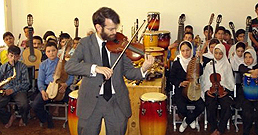Teaching music in Afghanistan has had a turbulent history, parallel with that of the country itself. Aattempts to establish a school of music date back fifty years, when according to an agreement between the governments of Afghanistan and Austria, a number of Austrian instructors were sent to Kabul to teach notation and music at a professional level to a small group of amateur musicians. This arrangement did not last more than ten years, and as political tension escalated, the Austrian teachers decided to leave rather than risk their lives.
However, they left their musical instruments and teaching facilities behind which proved to be of great use a few years later. They were utilized in the first music school officially established under the auspices of the Ministry of Education in 1973. The school survived until the mid-1980s, when it was merged with the School of Fine Arts and became a department of this newly formed educational entity.
The School somehow continued with its activities until the tumultuous events of 1992. With the entry of Mujahedin groups into Kabul and the intensification of the civil war, the School’s doors were closed to the arts, and the musical instruments were replaced by Kalashnikov guns and stockpiles of ammunition. It is not difficult to imagine what kinds of noises replaced the sound of music that used to echo in its corridors. The arrival of the Taliban four years later opened yet another horrific chapter in the history of the arts, not to mention that of the country as a whole. The Taliban’s fanatical edicts against all forms of art, and the appalling punishments meted out for any disobedience, are common knowledge. They banned practically all music as blasphemous, persecuting musicians, destroying instruments and burning recordings.
The departure of the Taliban in 2001 finally marked the dawning of a new era in the music of Afghanistan. First, the music department of the School of Fine Arts re-opened, albeit with great difficulty and lack of facilities. Then a few years later, Dr.Ahmad Sarmast came to the rescue with his vision of rebuilding Afghanistan’s musical infrastructure and creating a new national institution for musical education. He had lived in exile in Australia since the 1990s, where he completed his doctorate in musicology after conducting many years of research into the music of Afghanistan, resulting in a landmark book and several other publications.
The implementation of his project required funds which, in view of the continuing military action and urgent need for housing, water, electricity and medical care, was not an easy task. But through enormous effort, Dr.Sarmast was able to attract the support of many organizations, governments, and private donors from all over the world. Finally, the Afghanistan National Institute of Music, the very first body to provide both a general education and a musical training under the auspices of the Ministry of Education, was born.
Its curriculum is based on Afghanistan's general educational programme combined with a specialist musical training which has been developed in association with the National College of Music, London. The Institute offers the chance to all talented Afghan youth and children to study in a world-class music institute with the objective of becoming professional musicians or music educators. In particular, it has a strong commitment to support the disadvantaged street children and orphans who constitute half of its students. In addition to the eventual transformation of their own economic and social circumstances, these young people benefit from the healing power of music in a country still suffering from the physical and psychological ravages of over three decades of war.
This multimedia report takes us to the classrooms of this unique music school, where we can see some of the students and teachers in the course of training, and meet the Institute’s founder, Dr. Sarmast.
This multimedia report was first published in March 2011.


